жаңа формат сабағының презентациясы
жаңа формат сабағының презентациясы
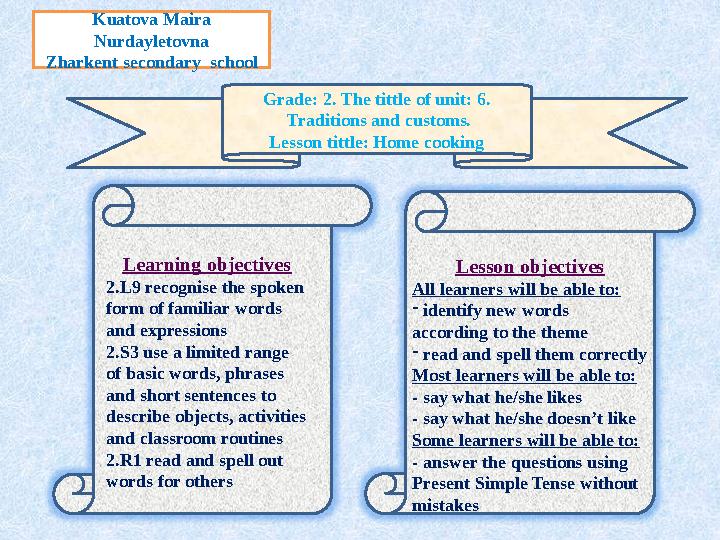

#1 слайд
Grade: 2 . The tittle of unit: 6.
Traditions and customs.
Lesson tittle: Home cooking
dvLearning objectives
2.L9 recognise the spoken
form of familiar words
and expressions
2.S3 use a limited range
of basic words, phrases
and short sentences to
describe objects, activities
and classroom routines
2.R1 read and spell out
words for others Lesson objectives
All learners will be able to:
-
identify new words
according to the theme
-
read and spell them correctly
Most learners will be able to:
- say what he/she likes
- say what he/she doesn’t like
Some learners will be able to:
- answer the questions using
Present Simple Tense without
mistakesKuatova Maira
Nurdayletovna
Zharkent secondary school
1 слайд
Grade: 2 . The tittle of unit: 6. Traditions and customs. Lesson tittle: Home cooking dvLearning objectives 2.L9 recognise the spoken form of familiar words and expressions 2.S3 use a limited range of basic words, phrases and short sentences to describe objects, activities and classroom routines 2.R1 read and spell out words for others Lesson objectives All learners will be able to: - identify new words according to the theme - read and spell them correctly Most learners will be able to: - say what he/she likes - say what he/she doesn’t like Some learners will be able to: - answer the questions using Present Simple Tense without mistakesKuatova Maira Nurdayletovna Zharkent secondary school
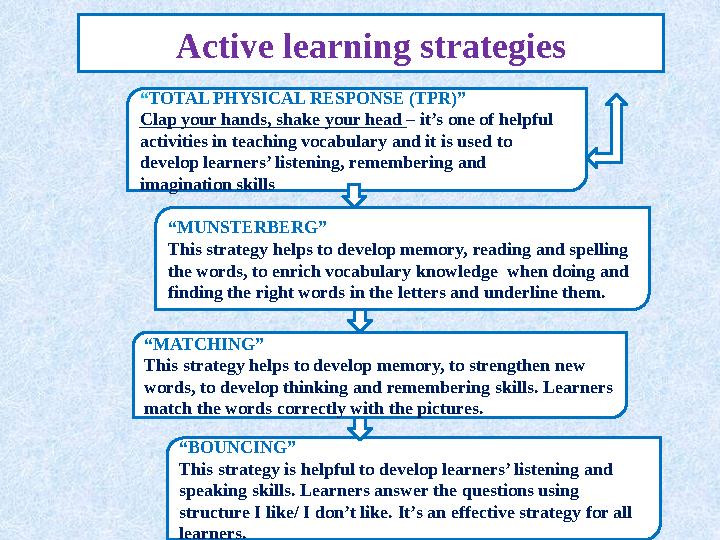
#2 слайд
Active learning strategies
“ TOTAL PHYSICAL RESPONSE (TPR)”
Clap your hands, shake your head – it’s one of helpful
activities in teaching vocabulary and it is used to
develop learners’ listening, remembering and
imagination skills
“ MUNSTERBERG”
This strategy helps to develop memory, reading and spelling
the words, to enrich vocabulary knowledge when doing and
finding the right words in the letters and underline them.
“ MATCHING”
This strategy helps to develop memory, to strengthen new
words, to develop thinking and remembering skills. Learners
match the words correctly with the pictures.
“ BOUNCING”
This strategy is helpful to develop learners’ listening and
speaking skills. Learners answer the questions using
structure I like/ I don’t like. It’s an effective strategy for all
learners.
2 слайд
Active learning strategies “ TOTAL PHYSICAL RESPONSE (TPR)” Clap your hands, shake your head – it’s one of helpful activities in teaching vocabulary and it is used to develop learners’ listening, remembering and imagination skills “ MUNSTERBERG” This strategy helps to develop memory, reading and spelling the words, to enrich vocabulary knowledge when doing and finding the right words in the letters and underline them. “ MATCHING” This strategy helps to develop memory, to strengthen new words, to develop thinking and remembering skills. Learners match the words correctly with the pictures. “ BOUNCING” This strategy is helpful to develop learners’ listening and speaking skills. Learners answer the questions using structure I like/ I don’t like. It’s an effective strategy for all learners.
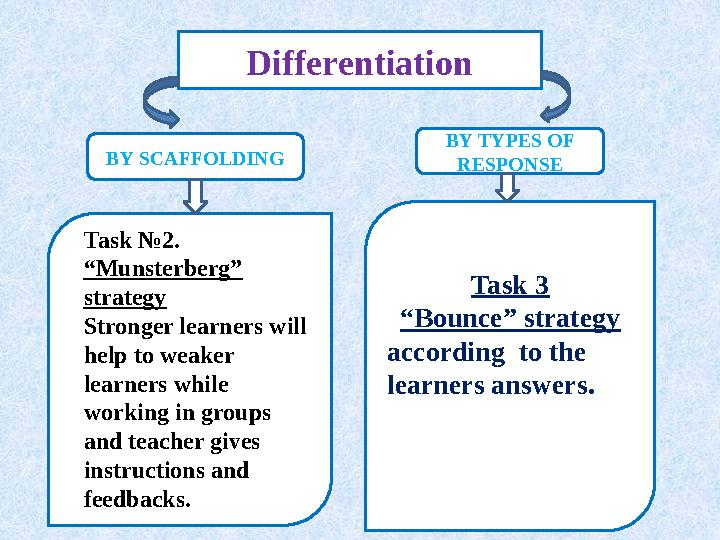
#3 слайд
Differentiation
BY SCAFFOLDING BY TYPES OF
RESPONSE
Task 3
“ Bounce” strategy
according to the
learners answers.Task №2.
“Munsterberg”
strategy
Stronger learners will
help to weaker
learners while
working in groups
and teacher gives
instructions and
feedbacks.
3 слайд
Differentiation BY SCAFFOLDING BY TYPES OF RESPONSE Task 3 “ Bounce” strategy according to the learners answers.Task №2. “Munsterberg” strategy Stronger learners will help to weaker learners while working in groups and teacher gives instructions and feedbacks.
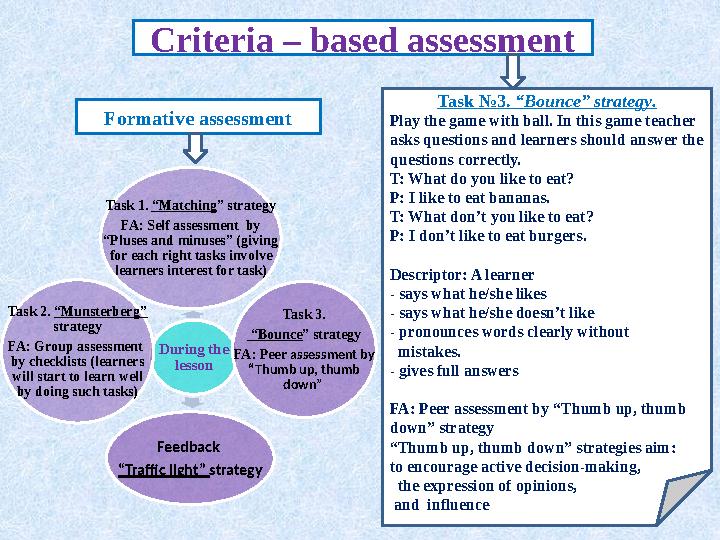
#4 слайд
Criteria – based assessment
Task № 3. “Bounce” strategy.
Play the game with ball. In this game teacher
asks questions and learners should answer the
questions correctly.
T: What do you like to eat?
P: I like to eat bananas.
T: What don’t you like to eat?
P: I don’t like to eat burgers.
Descriptor: A learner
- says what he/she likes
- says what he/she doesn’t like
- pronounces words clearly without
mistakes.
- gives full answers
FA: Peer assessment by “Thumb up, thumb
down” strategy
“ Thumb up, thumb down” strategies aim:
to encourage active decision-making,
the expression of opinions,
and influenceFormative assessment
During the
lessonTask 1. “Matching ” strategy
FA: Self assessment by
“Pluses and minuses” (giving
for each right tasks involve
learners interest for task)
Task 3.
“ Bounce ” strategy
FA: Peer assessment by
“Thumb up, thumb
down ”
Feedback
“ Traffic light” strategyTask 2. “Munsterberg”
strategy
FA: Group assessment
by checklists (learners
will start to learn well
by doing such tasks)
4 слайд
Criteria – based assessment Task № 3. “Bounce” strategy. Play the game with ball. In this game teacher asks questions and learners should answer the questions correctly. T: What do you like to eat? P: I like to eat bananas. T: What don’t you like to eat? P: I don’t like to eat burgers. Descriptor: A learner - says what he/she likes - says what he/she doesn’t like - pronounces words clearly without mistakes. - gives full answers FA: Peer assessment by “Thumb up, thumb down” strategy “ Thumb up, thumb down” strategies aim: to encourage active decision-making, the expression of opinions, and influenceFormative assessment During the lessonTask 1. “Matching ” strategy FA: Self assessment by “Pluses and minuses” (giving for each right tasks involve learners interest for task) Task 3. “ Bounce ” strategy FA: Peer assessment by “Thumb up, thumb down ” Feedback “ Traffic light” strategyTask 2. “Munsterberg” strategy FA: Group assessment by checklists (learners will start to learn well by doing such tasks)
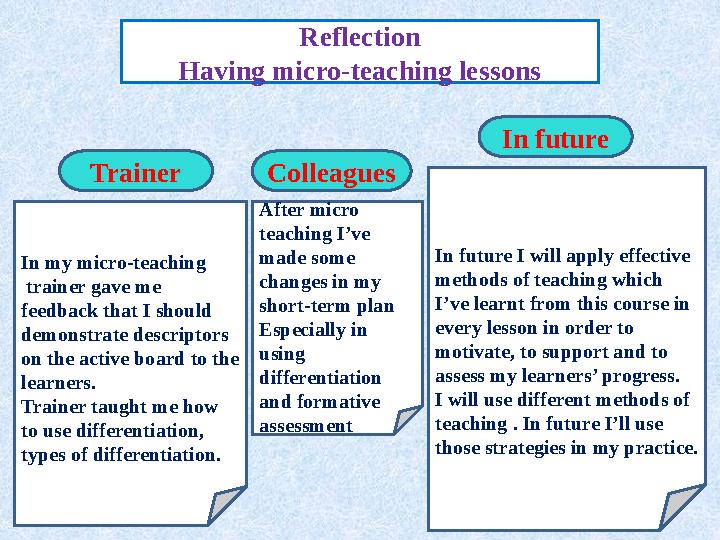
#5 слайд
Reflection
Having micro-teaching lessons
In my micro-teaching
trainer gave me
feedback that I should
demonstrate descriptors
on the active board to the
learners.
Trainer taught me how
to use differentiation,
types of differentiation. After micro
teaching I’ve
made some
changes in my
short-term plan
Especially in
using
differentiation
and formative
assessment In future I will apply effective
methods of teaching which
I’ve learnt from this course in
every lesson in order to
motivate, to support and to
assess my learners’ progress.
I will use different methods of
teaching . In future I’ll use
those strategies in my practice.
Trainer Colleagues In future
5 слайд
Reflection Having micro-teaching lessons In my micro-teaching trainer gave me feedback that I should demonstrate descriptors on the active board to the learners. Trainer taught me how to use differentiation, types of differentiation. After micro teaching I’ve made some changes in my short-term plan Especially in using differentiation and formative assessment In future I will apply effective methods of teaching which I’ve learnt from this course in every lesson in order to motivate, to support and to assess my learners’ progress. I will use different methods of teaching . In future I’ll use those strategies in my practice. Trainer Colleagues In future

шағым қалдыра аласыз
















